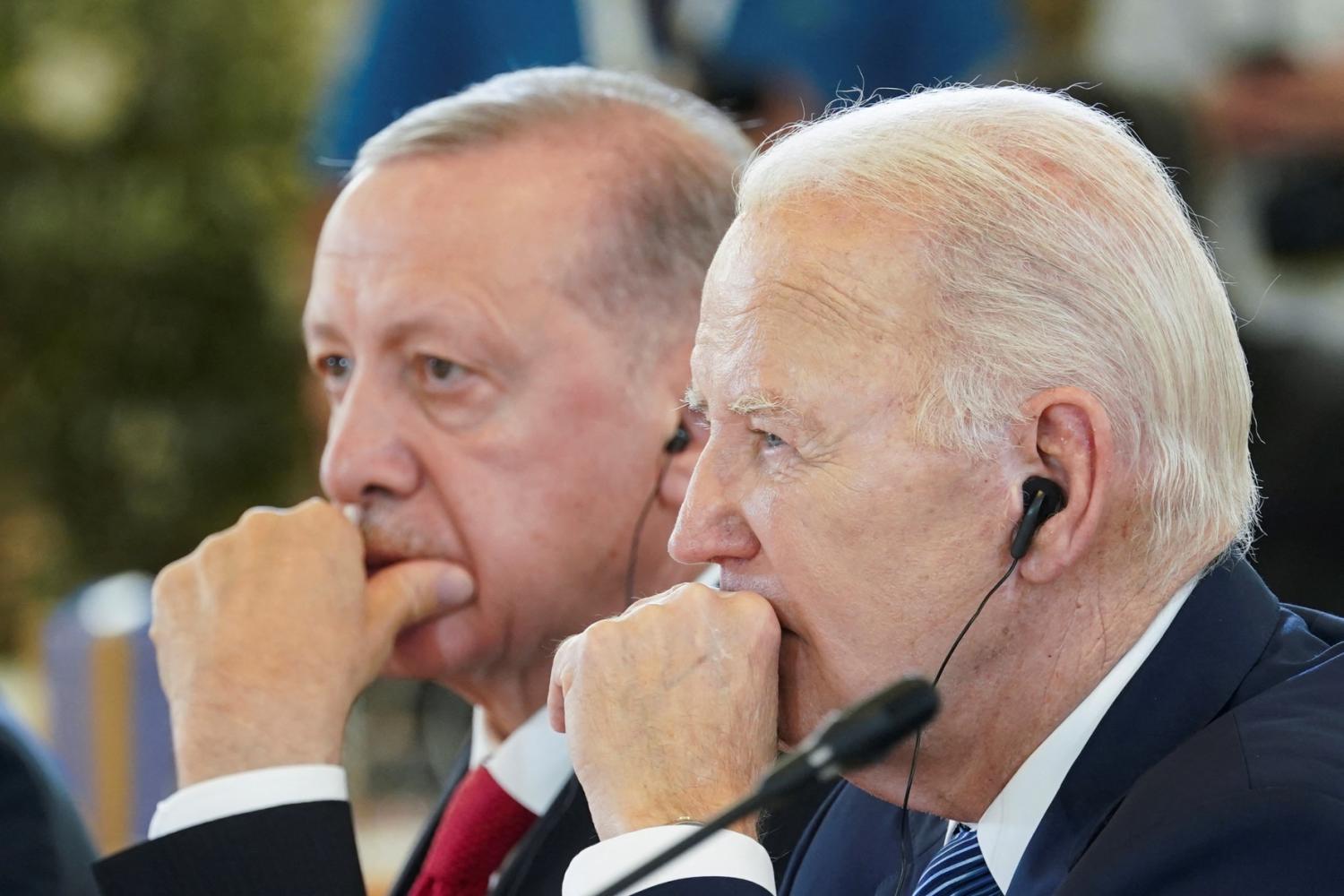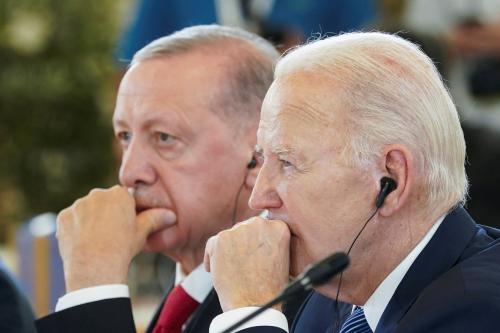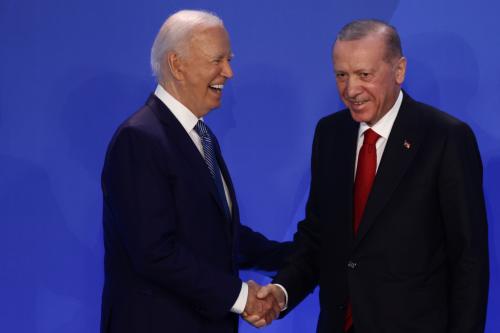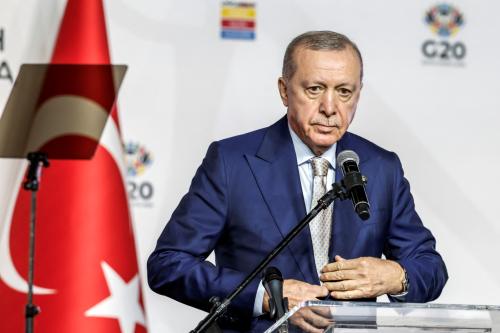In his essay “The Clash of Civilizations?”, Samuel Huntington famously argued that Turkey was “the most obvious and prototypical torn country.” Huntington held that Turkey was pulled between desires to become European and to assert its influence in the Muslim Middle East and in ethically Turkic Central Asia. In a September 2024 speech, President Recep Tayyip Erdoğan tried to dispel long-held concerns among Turkey’s Western allies that it was drifting from the West: “Of course, our face is turned to the West, but this certainly does not mean that we will turn our backs on the East, that we will ignore the East, or not improve our ties with the East.”
Even though many Turks want their country to deepen its ties with Muslim and Turkic nations, they nonetheless overwhelmingly favor a Western orientation. According to a recent Pew Research Center survey, Turks see the European Union (EU) and NATO more positively than other world powers. A majority, 56%, favor Turkey becoming a member of the European Union, and Turks have become more positive in their views of NATO since Russia’s invasion of Ukraine, with 42% now holding a favorable view of the defense alliance.
Turkey’s pragmatism and national security imperatives
The aim of Turkey’s foreign and national security policies has been to ensure the survival and strength of the state and to secure advantages for it. Accordingly, pragmatic rather than ideological considerations have determined Ankara’s international choices for the past century. Moreover, the national security imperative—and the interrelated economic interests of the ruling elite—has determined Turkey’s domestic course, the swings between authoritarianism and liberal-democratic openings.
After World War II, Turkey needed American protection against the Soviet Union as well as U.S. financial aid. But the Turkish one-party regime was compromised by its pro-Nazi bent and had to prove to the West that it could be a respectable ally. This induced President İsmet İnönü to accept multiparty democracy. The next major democratic transformation took place roughly half a century later, when the state elite consented to the reforms that the Islamic conservative Justice and Development Party (AKP) implemented during its first decade in power. The AKP dismantled the system of military oversight over civilian politics to make Turkey eligible for membership in the EU. The realists in the military recognized that Turkey, whose economy was in free fall, needed to gain the confidence of Western investors and that it was crucial that the EU agreed to start the membership process.
During the past decade, however, national security concerns have fueled an authoritarian backlash. In 2015, Erdoğan rescinded the peace deal that his government had reached with the Kurdish movement, after the Turkish state establishment concluded that the empowerment of Kurdish militants in Syria threatened to subvert government control in Turkey’s heavily Kurdish regions. He has aligned with the far-right Nationalist Action Party (MHP) and espoused nationalism to stay in power over the past decade. This alliance has pushed Erdoğan to the far right, notably on the Kurdish issue. Today, MHP cadres populate the state security apparatus and the judiciary, where they have replaced the Gülenist cadres after the failed coup in 2016.
However, today the national security imperative once more compels the Turkish ruling elite to make democratic concessions.
Signs of change
It’s no secret that there is a constituency inside the ruling AKP that is unhappy with the party’s dependency on the MHP and hardline policies. In 2020, Bülent Arınç, a former deputy prime minister and one of the key founders of the AKP, alongside Erdoğan and former President Abdullah Gül, called for the release of former pro-Kurdish party leader Selahattin Demirtaş and human rights activist Osman Kavala. Arınç was criticized harshly by MHP leader Devlet Bahçeli and forced to resign as presidential advisor. Mehmet Metiner, a former AKP parliamentarian, recently said that “those who have turned the AKP from the party of the people into the party of the state have led it to political failure.”
The dissenters hold that the AKP’s steady electoral decline since 2018 is a result of its swing toward far-right Turkish nationalism, and they instead advocate for more liberal policies and a return to the rule of law, which they view as necessary to attract Western investors to save the economy and prevent a looming defeat in the next general election. The results of the local elections earlier this year, when the AKP for the first time in 22 years lost its position as the leading party, vindicated these critics, but they were quickly rebuffed. Mehmet Uçum, a hardline nationalist who is one of Erdoğan’s chief advisors, warned that “the pro-Western neoliberals, who feel emboldened and interpret the election results as having created the conditions for a capitulation to the hegemonic forces in the West, will be cut down to size by the national state.”
Yet the far-right nationalists are ultimately no less pragmatic than others in the Turkish state elite. This is because they are statists first. Historically, Turkish nationalism has been a response to the needs of the state—as secularism, Islam, and liberalism too have been in different circumstances—not an end itself. When the Turkish parliament reconvened for its new term on October 1, MHP leader Devlet Bahçeli unexpectedly shook hands with the lawmakers from the pro-Kurdish Peoples’ Equality and Democracy Party. This is a group whose members have been jailed and whose previous incarnation, the Peoples’ Democracy Party, is under threat of closure, which Bahçeli has pushed for. “We are entering a new era, and when we call for peace in the world, we must also secure peace in our own country,” Bahçeli explained, adding that his outstretched hand was not a spur-of-the-moment decision but a carefully assessed message of national unity and brotherhood. On October 22, Bahçeli suggested that Abdullah Öcalan, the imprisoned leader of the Kurdistan Workers’ Party could be granted parole if he renounces violence and disbands the organization.
Erdoğan has embraced the overture. He praised Bahçeli and said that the alliance of the AKP and MHP wishes to solve the country’s problems in the “broadest possible agreement” in the new era, enjoining others to take steps toward dialogue and reconciliation. “Then, God willing, we will be able to broaden the societal base for the adoption of a new constitution,” he said. Not coincidentally, a new constitution would make it possible for Erdoğan to stand for reelection. Turkey’s constitution limits Erdoğan, who was first elected president in 2014, from running from office again unless early elections are called. Yet while that is surely one rationale behind the new opening to the Kurds, it is not the only one.
A window for reform
Despite having consolidated its power, the Turkish regime appears to recognize that the volatility in its neighborhood and smoldering discontent at home could potentially jeopardize its survival. As elsewhere, the deepening misery of the working class and the massive influx of refugees make for a combustible mix, further fostering nationalism. Hate crimes against immigrants are on the rise and in July 2024, rumors on social media led to a public rampage against Syrian refugees in Kayseri, in central Anatolia. The war and chaos in the Middle East have made the Turkish state elite attentive to the need, in the words of Erdoğan, to “fortify the home front” by defusing ethnic tensions.
This provides a window of opportunity for the West to reengage with Turkey on democratization and reform. To do so, the U.S. administration should pursue a dual strategy, pressuring Turkey to live up to NATO’s democratic standards while accommodating its security concerns. This is a multipronged strategy that would involve Turkey’s defense needs, lifting Countering America’s Adversaries Through Sanctions Act sanctions on Turkey, and a domestic democratic opening. Washington should make the upgrading of U.S.-Turkey relations and the readmission of Turkey to the F-35 fighter jet program conditional on the release of Turkey’s prominent political prisoners, such as Demirtaş, Kavala, and Can Atalay—all of whom are still incarcerated in violation of the European Court of Human Rights’ rulings. But in return, Washington should also resolve to explore a solution in Syria that takes Turkey’s legitimate security concerns into due consideration.
It’s in America’s interest to encourage liberal reform in Turkey. The Biden administration has defined the current global contestation as a systemic rivalry between democracies and autocracies. To overlook violations of democratic principles among NATO members would undermine the credibility of the Western alliance as a bulwark of democracy.
History teaches that Turkey’s fear of being deprived of Western protection can be used to induce it to make democratic transitions. Turkey’s choices are dictated by the imperative of state security, with nationalism and liberalism deployed interchangeably. Now that the Turkish regime needs to broaden its societal base and secure Western support, American engagement will once again make a difference.
The Brookings Institution is committed to quality, independence, and impact.
We are supported by a diverse array of funders. In line with our values and policies, each Brookings publication represents the sole views of its author(s).







Commentary
What are the prospects for liberal change in Turkey?
October 30, 2024